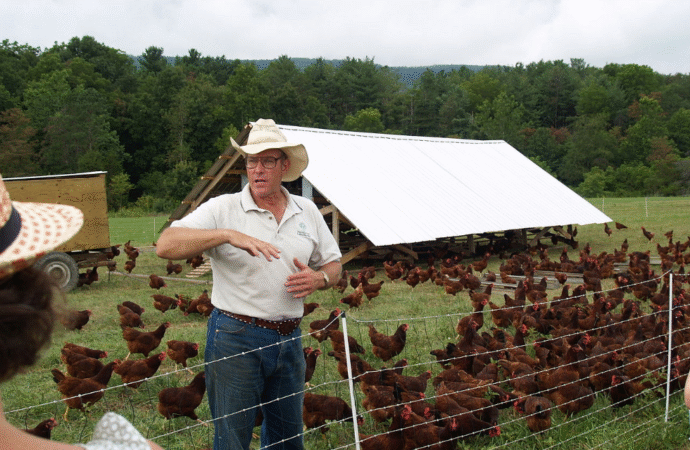Recently I attended the 2025 Homesteaders of America Conference in Virginia. Some 6,500 organizers, speakers, vendors, and attendees packed the fairground parking lots and a couple of acres of grass with cars and trucks, and blessed by a bright sun, had a grand time together.
Here under tents were companies like Home Grown Collective, Egg Brigade Chicken Treats, and Front Yard Foods. Under larger tents men and women spoke to audiences on practical topics like “Raising Meat Rabbits for the Homestead,” “Everyday Sourdough: A Beginner’s Guide,” and “Free Bees, Feral Bees, the Best Bees,” as well as on broader subjects like “Generational Homesteading,” “Learning to Hear God’s Voice in the Garden,” and “How to Battle the Government and Win.”
For the last three years, I’ve gone to this convention looking for stories and have never been disappointed. Besides the speakers and attendees, there are well over 100 vendors, so opportunity abounds. This year, for instance, I caught part of Rebekah and John Lovell’s talk on “The Homeschooler’s Guide to Homesteading.” Impressed by their enthusiasm and the stories they told, I joined the line of people wanting a word with them afterwards.
There’s an irony in my participation. Of all in this crowd, I probably have the least interest in raising goats or chickens, planting a vegetable garden, or canning tomatoes, yet the convention draws me for more than workaday reasons. I like the atmosphere and people, from elderly folks on canes to the kids tossing around a football to the strangers exchanging tips about everything from medicinal herbs to growing potatoes.
Most of all, I like the faces, the voices, and the laughter. There’s joy in this place, and that’s a commodity much more valuable than my expenditure of time.
Community is the chief reason for this joy. Although the visitors and vendors tend to be Christian and conservative, no one is here to hash out politics or rage about the latest headlines in the news. No, they’ve come to get tips on raising rabbits or maintaining a pasture while connecting with other folks who share their interests. They’re living proof that lots of things matter as much or more than the latest shenanigans of the federal government or the ugly side of a culture far removed from their gardens and farms.
Like the family, community is a nutrient crucial to the good health of a civilized society. And like the crops and livestock raised up by these homesteaders, communities require nurturing and participation. You can’t command carrots to grow or order goats to give milk. All these things require care, attention, and love. Communities are the same. They grow by shared interests, shared visions, and shared affections.
In his article “Alexis de Tocqueville and the Art of Association,” Daniel Stid revisits Tocqueville’s “Democracy in America” and what that French visitor termed “civil associations.” Tocqueville, writes Stid, believed that these associations, which here I have called communities, were invaluable for two reasons. They greatly reduced the dependence of Americans on government, and they helped shape those Americans into better citizens and leaders. These may seem obvious to us now, but Tocqueville saw them as they were then, a unique response to a new nation’s wants and needs.
Stid argues that such associations are diminished nowadays, though they remain a necessary part of our ongoing American experiment. He notes, for example, many of our non-profit organizations, once small and staffed largely by volunteers, are now operated by paid employees.
One gift provided by these little communities which is glossed over in Stid’s argument is fellowship. In the last few decades, and particularly since the Covid mess, polls have shown more and more Americans suffering from loneliness and depression. Many of us act as if this epidemic of loneliness was, like Covid, some sort of plague running rampant through society, yet much of this isolation is self-imposed. Families and friendships broken by politics, declining attendance at church, a preference for screens rather than for human beings: these are only a few of the root causes for loneliness in our time.
If you’re one of these lonely people, let me suggest you take the initiative and either find a community to your liking or found one yourself. Whether it’s a hiking club, a choir, a book club, volunteering in a school, or joining a church: all these and more can connect you to like-minded people from whom friendships may spring.
“To make a friend, be a friend.” That antique adage is as true as ever.
—
The republication of this article is made possible by The Fred & Rheta Skelton Center for Cultural Renewal.
Image Credit: StockSnap
















Leave a Comment
Your email address will not be published. Required fields are marked with *